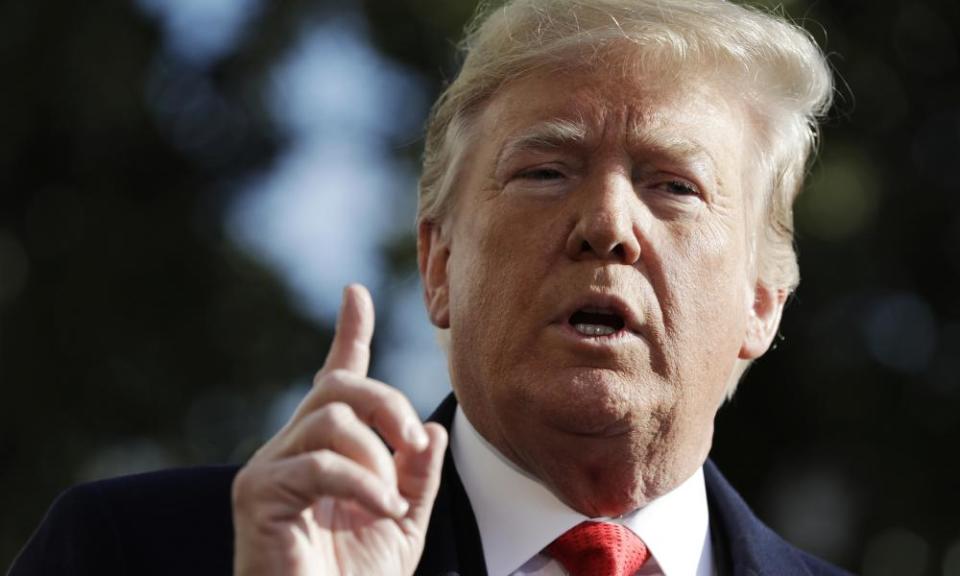Trump's praise for Roger Stone could amount to witness tampering – experts
President on Stone: ‘Nice to know some people still have guts!’
Tweet seemed to breach US code but case may be hard to prove

Donald Trump heaped public praise on a potential witness in the Russia investigation on Monday in a manner that legal experts said could amount to criminal witness tampering.
Trump tweeted in praise of Roger Stone, his longtime political adviser, who allegedly made contacts with the WikiLeaks organization through an intermediary in an effort to help the 2016 Trump campaign. Stone has denied all wrongdoing but has said he expects to be indicted.
The flow of information between the Trump campaign and WikiLeaks, which published emails stolen by Russians from the Hillary Clinton campaign, has emerged as a focal point for the special counsel Robert Mueller, who has yet to interview Stone.
“‘I will never testify against Trump’,” the president tweeted. “This statement was recently made by Roger Stone, essentially stating that he will not be forced by a rogue and out of control prosecutor to make up lies and stories about ‘President Trump.’ Nice to know that some people still have ‘guts!’”
“I will never testify against Trump.” This statement was recently made by Roger Stone, essentially stating that he will not be forced by a rogue and out of control prosecutor to make up lies and stories about “President Trump.” Nice to know that some people still have “guts!”
— Donald J. Trump (@realDonaldTrump) December 3, 2018
Prominent lawyers and analysts led by George Conway, the husband of counselor to the president Kellyanne Conway, said the tweet appeared to violate a section of the US code that makes it a federal crime to “corruptly persuade” a witness with intent to influence or prevent that witness’s testimony in a criminal proceeding.
File under “18 U.S.C. §§ 1503, 1512” https://t.co/e4ZGVn1kJi
— George Conway (@gtconway3d) December 3, 2018
The offense, which prosecutors said is common in organized crime cases, is not typically committed in public because it is illegal activity, lawyers said.
“Having prosecuted mob bosses,” tweeted Daniel Goldman, a former assistant US attorney in the southern district of New York, “it’s unfair to compare them to Trump. Mob bosses are far smarter and way more savvy and discrete than Trump.”
Having prosecuted mob bosses, it’s unfair to compare them to Trump. Mob bosses are far smarter and way more savvy and discrete than Trump.
— Daniel Goldman (@danielsgoldman) December 3, 2018
“George is right,” tweeted Neal Katyal, a supreme court lawyer and law professor. “This is genuinely looking like witness tampering… The fact it’s done out in the open is no defense.”
“This is witness tampering under 18 USC 1512(b), which makes it illegal to ‘cause or induce any person to withhold testimony’,” tweeted Norm Eisen, a lawyer and former ambassador who has analyzed the question for the Brookings Institution.
But it would be difficult to prove a witness tampering case against the president based on the tweet alone because Trump could dispute that he praised Stone with a corrupt motive, other lawyers said.
“The President isn’t tampering if he’s genuinely just saying ‘hooray for Roger Stone telling the truth’,” said Ken White, host of Make No Law: The First Amendment Podcast, who tweets @popehat.
“Though it’s very hard to prove this is witness-tampering, it’s absolutely norm-violating, and if a CEO or mob boss or other authority figure did it, the feds would absolutely crawl up their ass and look for a way to charge them for it.”
/12 Though it's very hard to prove this is witness-tampering, it's absolutely norm-violating, and if a CEO or mob boss or other authority figure did it, the feds would absolutely crawl up their ass and look for a way to charge them for it.
— ScottFreeHat (@Popehat) December 3, 2018
Former US attorney Renato Mariotti agreed that the Trump tweet alone would be difficult to prove as witness tampering because “Trump’s lawyers would argue that the purpose of his tweet was to influence the public, not Stone, and that they could have spoken to Stone’s attorney privately if Trump actually wanted to influence him.”
Others noted that Trump’s praise for Stone followed closely on the heels of a pair of tweets in which the president attacked his former lawyer, Michael Cohen, accusing Cohen of lying to win a reduced sentence on charges of making false statements to Congress, campaign finance crimes and other charges.
“He lied for this outcome and should, in my opinion, serve a full and complete sentence,” Trump tweeted about Cohen. The contrast between that tweet and the subsequent tweet praising Stone could represent an effort by the president to dangle a pardon to Stone if he is convicted of a crime in the future, analysts said.
Dangling a pardon in such a way is probably illegal, the Harvard law professor Alex Whiting wrote in March on the Just Security blog in discussing the cases of the former national security adviser Michael Flynn and former campaign chairman Paul Manafort, whom Trump praised in August for “refus[ing] to “break” under pressure from Mueller. Manafort later reached a plea deal with Mueller, which fell apart last week.
“If the dangle is found to be orchestrated with a corrupt motive,” wrote Whiting, “it should qualify as a potential act of obstruction of justice.”
Trump’s praise for Stone appeared to be prompted by an appearance by Stone on Sunday on ABC News.
“There’s no circumstance under which I would testify against the president because I’d have to bear false witness against him,” Stone said. “I’d have to make things up, and I’m not going to do that.”

